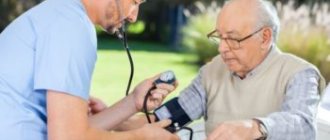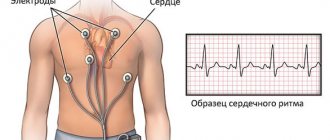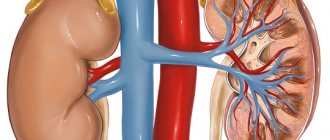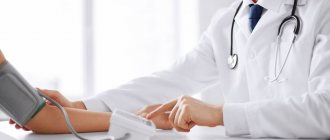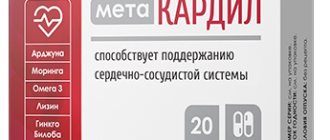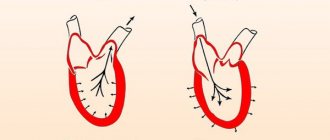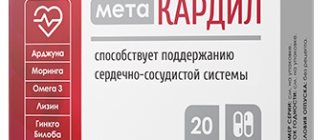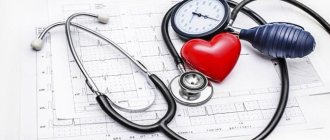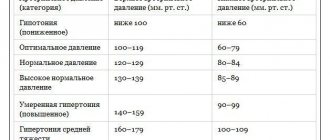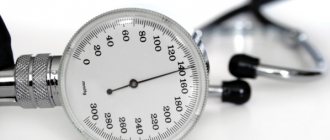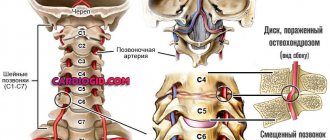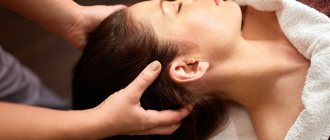Hypertension can go undetected for a long time. Sometimes a person suffering from high blood pressure is not even aware of his condition, since his health remains excellent. When symptoms begin to appear, the time for prevention has already passed and treatment must be started immediately. This is especially true when the blood pressure monitor shows a pressure of 170/100.
What does blood pressure 170/100 mean?
Each person has his own pressure indicators, which are considered his individual norm.
At the same time, there is a certain corridor of safe parameters. Its boundaries are 140/90 and 90/60. If blood pressure has exceeded 160 and the tonometer displays the numbers 170 to 100, you need to call an ambulance. Your doctor will tell you in an individual conversation what this pressure means at your age. As a rule, with these indicators, the patient is diagnosed with hypertension.
Blood pressure should not be measured in a hurry, while running, or after a person has drunk coffee, smoked or consumed alcoholic beverages. All these factors can increase indicators and distort current data on a person’s health status.
By itself, a reading of 170 is not critical, but in combination with a diastolic reading of 100, this pressure carries a certain danger. The difference between the upper and lower indicators - pulse pressure should not exceed 30-50 units. Its growth may indicate wear and tear of the heart muscle and other pathologies that reduce its functionality. To determine the causes and understand what to do with regular surges in blood pressure, you need to be examined by a therapist.
Remember that only a highly qualified specialist can make an accurate diagnosis based on a full examination of the patient. When measuring your blood pressure at home, do not diagnose yourself.
What are the implications of these indicators?
If readings of 170/100 appear regularly when measuring blood pressure, you need to seriously think about your lifestyle. Pressure surges can be caused by a huge number of unfavorable factors. A person can eliminate half of them himself by adjusting his diet and getting rid of bad habits.
But you will have to get rid of the consequences of your neglectful attitude towards health in a hospital setting. Advanced hypertension and lack of treatment with indicators of 170 to 100 are fraught with:
stroke;- heart attack;
- paralysis;
- damage to internal organs caused by oxygen starvation;
- rhinopathy and glaucoma.
And also read on our website: What do blood pressure readings of 110 to 110 mean - is this possible, the reasons, what to do and what to drink?
Unfortunately, once you encounter hypertension, you will no longer be able to get rid of it. High blood pressure will accompany you throughout your life. The only thing a doctor can do is prescribe a comprehensive treatment that will keep your blood pressure normal.
In no case do not cancel the prescribed medications once you feel better. Only regular use of antihypertensive drugs will stabilize the functioning of the heart muscle, relieve stress on the blood vessels and make it possible to lead a normal lifestyle.
Causes
Blood pressure levels may increase with severe emotional shock and physical exertion. This is not considered a pathology, since after eliminating the irritating factor, the person’s condition returns to normal. Hypertension can develop against the background of pre-existing diseases. The risk group includes people with diseases such as:
- obesity;
- physical inactivity;
- renal failure;
- diabetes;
- atherosclerosis;
- phlebeurysm.
Poor nutrition has a huge impact on the cardiovascular system. Eating large amounts of cholesterol-containing foods leads to the development of atherosclerosis and, as a result, pressure surges. Frequent consumption of salt worsens the condition of blood vessels, they become fragile, and their elasticity decreases.
Excessive physical activity and stress deplete the nervous system and lead to malfunction of the heart muscle. Alcoholic drinks and nicotine constantly poison the body, causing vascular spasms.
Each of the above factors poses a threat to human health. If they are combined with each other, the likelihood of getting hypertension increases tenfold.
Possible consequences and complications
In the absence of adequate treatment and stable maintenance of blood pressure at the level of 170/100, a person can develop serious disturbances in the functioning of all organs and systems of the body. The most commonly affected areas are the eyes, heart, brain and kidneys.
The most common complications:
- renal/heart failure;
- cerebral stroke;
- myocardial infarction;
- myocardial hypertrophy – enlargement of the heart muscle due to its thickening;
- retinopathy – damage to the retina;
- cerebral aneurysm;
- dementia;
- paralysis.
Important! The development of such complications quite often causes a person’s disability or death.
Symptoms
The patient can find out about a jump in blood pressure by the following symptoms:
- headache;
- noise in ears;
- general malaise;
- attacks of nausea;
- foggy consciousness;
- hand tremors
Shortness of breath, spots before the eyes, and heart pain may also occur. A sharp jump in blood pressure during a hypertensive crisis has a more pronounced clinical picture, but you should not allow your body to reach a critical state. Therapy should begin at the first alarming symptoms, regardless of the intensity of their manifestation.
Preventive visits to the doctor play a huge role in controlling blood pressure. The fact is that when a person suffers from high blood pressure for a long time, the symptoms appear less pronounced and the body gets used to them.
Pulse
The faster the heart muscle contracts, the higher the heart rate.
100 beats per minute does not require correction if the pressure surge is provoked by physical activity or stress. The number of strokes will decrease on its own pretty soon. And also read on our website: What to do if the pressure is 100 to 100, why is it dangerous and what are the pulse values?
If you notice regular tachycardia, you need to undergo additional examination for the presence of pathologies of the heart muscle, diseases of the endocrine system, as well as oncological tumors.
In most cases, stabilizing the pressure at 170 over 100 leads to normalization of the pulse. That is why additional treatment for rapid heartbeats with high blood pressure is not required.
Hypertensive crisis
IT IS IMPORTANT TO KNOW!
STILL STRUGGLE WITH ARTERIAL HYPERTENSION INCORRECTLY? Reduces stress hormone levels and prevents oxygen starvation Read more »
At a persistent pressure of 170/100 mm Hg. Art. Due to impaired blood circulation, a critical condition of the body develops, which in medicine is called a hypertensive crisis. A hypertensive crisis is not just a sudden jump in pressure, but a long-term condition characterized by a sharp increase in blood pressure and a number of pronounced symptoms indicating insufficiency of general circulation. In addition to a critical increase in blood pressure, this condition is accompanied by the following symptoms:
- trembling in the body;
- terrible headaches;
- dizziness, up to loss of consciousness;
- increased body temperature;
- numbness and coldness of the extremities;
- heart pain;
- feeling of goosebumps;
- lack of air;
- frequent urination;
- spontaneous movement of the eyeball.
During a hypertensive crisis, the patient experiences a feeling of fear and anxiety that is difficult to overcome. Deterioration of vision and loss of orientation in space are also possible. A crisis can last for several minutes or several days. Usually this condition does not go away on its own, without taking medication. But if the symptoms go away on their own, then this provokes the development of significant damage to internal organs.
A hypertensive crisis with a pressure of 170 over 100 can cause a heart attack or stroke, edema of the brain, lungs, paralysis, as well as heart or kidney failure. To prevent this from happening, it is necessary immediately, as soon as a hypertensive crisis occurs, to take a drug that helps to urgently reduce blood pressure. Your doctor will help you with the correct choice of such medicine and its dosage. You should also take a sedative and ensure air flow. If vision or speech disturbances, loss of consciousness or a feeling of paresthesia occur, you must call an ambulance.
Diagnosis of stage 2 hypertension
If the tonometer shows blood pressure 170 per 100 mm Hg. Art. for the first time, then it is necessary to take a second measurement, and in the case of the same indicators, as well as if there is a deterioration in health, it is necessary to urgently seek medical help. If such high rates are not an isolated phenomenon, then stage 2 hypertension is diagnosed. In order to make an accurate diagnosis, as well as identify the cause of the pathology, the doctor prescribes the following diagnostic measures:
- measuring blood pressure with a tonometer;
- thorough questioning and examination of the patient;
- blood analysis;
- ultrasonography;
- electrocardiogram;
- Dopplerography;
- aortography, arteriography;
- fundus examination.
Based on the examination results, the doctor makes an accurate diagnosis and prescribes comprehensive treatment aimed at both eliminating symptoms and getting rid of the root cause of arterial hypertension.
What to do with such blood pressure?
Only with regular use of medications can the functioning of the cardiovascular system be stabilized. If this is your first time encountering high blood pressure, your doctor will tell you how to bring it down. In the future, if a similar situation develops, you will be able to help yourself by taking the prescribed drug.
At home, it is recommended to reduce the increase in blood pressure with Captopril. This is a fast-acting drug that stabilizes the patient’s condition and reduces the load on the heart. Also no less effective are:
- Nifedipine -10 mg;
- Moxonidine - 0.2-0.4 mg;
- Propranolol - 10-40 mg.
The drugs begin to have an antihypertensive effect within 20 minutes, so after half an hour the blood pressure readings should be changed again.
The patient should be placed on the bed and provided with access to fresh air, for example, by opening a window. If a person is in a state of agitation, you can give him a sedative. Some doctors recommend doing a warm foot bath or placing a cold compress on the back of your head.
If your efforts have not brought results within 2 hours, you must call an ambulance.
How to normalize blood pressure
With single surges in blood pressure
With a one-time increase in blood pressure of 170/100 in adults, it is necessary to identify the cause of the disorder. If the pressure has increased due to external irritants, you need to calm down, wait a while, and measure the pressure again. When the condition normalizes, the help of a specialist is not required.
If a one-time jump in blood levels is provoked by nervous overexcitation, stress, anxiety, you need to calm down. Light sedatives will help with this:
- peony tincture;
- valerian;
- Corvalol;
- diuretic drug.
With persistently elevated blood pressure
If your blood pressure rises steadily for several days in a row and regular deviations in blood levels are noted, you should consult a doctor. Hypertension should be treated comprehensively: with medications and lifestyle changes.
Doctors recommend giving up excessive salt consumption, establishing proper nutrition, giving up alcohol and smoking, and reducing physical activity. In old age, these measures will not be enough.
In old age, medications should be taken with extreme caution so as not to overload the heart. First aid should be provided by doctors who will administer blood pressure-stabilizing injections. The drugs are introduced gradually, the process of lowering arterial parameters must be monitored to avoid hypotension.
You can lower your blood pressure with antihypertensive drugs. To lower blood pressure to 170 to 100, medications of different pharmacological groups are used:
| Pharmacological affiliation of the drug | Names of medicines |
| Calcium antagonists | Amlodipine Verapamil |
| Neurotropic agents | Methyldopa Moxonidine |
| Diuretics | Indapamide Oxodoline |
| Adrenergic blockers | Atenolol Cardura Carvedilol |
| Angiotensin-converting enzyme inhibitors | Candesartan Capoten Losart Enalapril |
The attending physician will decide what pills to take if the blood pressure is 170/100 after an examination.
Antihypertensive drugs of various groups
Providing first aid during a hypertensive crisis
First aid for high blood pressure 170 to 100 mm Hg. Art. will help stabilize the condition until the ambulance arrives:
- calm the patient;
- remove tight clothes or unbutton collars;
- open a window or vent to provide fresh air;
- apply a cold compress to your forehead and wrap your feet in a warm blanket;
- give a tablet of Nitroglycerin or Anaprilin;
- additionally give Clonidine or Enalapril;
- place mustard plasters under the ankles, on the shoulders, on the back of the neck;
- pour weak hibiscus tea or green tea, which lowers blood pressure;
- Apply a compress of apple cider vinegar to your feet for 20 minutes;
- apply a heated bag of salt to the lumbar region or the back of the head;
- for heart pain, give the patient a Glycerin tablet under the tongue.
You should not give medications that have not been prescribed by a specialist, as this may worsen the situation. If you have high blood pressure, the Captopril tablet will help normalize the condition; it gives an immediate effect, but you must strictly follow the dosage prescribed by your doctor, otherwise the opposite effect may occur.
It is necessary to provide assistance to the person even before the ambulance arrives.
If 30 minutes after taking the medication the pressure has not dropped, the patient should be given another tablet. When using medications, do not mix tablets. Treatment should be carried out with only one prescribed drug.
After the ambulance team arrives, it is necessary to tell the doctors in detail about the patient’s condition, symptoms, and behavior. The doctor must know what medications the patient was taking, concomitant diseases, known disorders in the functioning of organs, which preceded the jump in blood pressure.
Medical care can be provided to the patient on an outpatient or inpatient basis. The decision about hospitalization is made by the doctor. If the patient is in serious condition, he is taken to the hospital where emergency treatment is carried out. After the condition normalizes, the doctor will conduct a comprehensive examination and select further therapy.
Treatment with folk remedies
Traditional medicine plays a huge role in the treatment of hypertension. Of course, it is foolish to hope that tea made from medicinal herbs will help improve the functioning of the heart muscle, but sometimes natural medicines can enhance the effects of synthetic drugs and become an excellent addition to complex therapy. Among non-traditional methods, the following recipes have proven themselves very well:
- A compress of apple cider vinegar applied to a person’s feet during a surge in blood pressure can reduce blood pressure readings by at least 30 units;
- Add a spoonful of fresh honey to a glass of mineral water and squeeze out the juice from half a lemon. The liquid is drunk in one gulp. The drink helps reduce blood pressure in critical situations;
- A decoction of millennium is prepared. The herb can be purchased at the pharmacy; all you have to do is steam it in boiling water three times a day and use it instead of tea;
- Fresh beets are grated and the resulting juice is drunk 50 g before each meal.
And also read on our website: What does blood pressure 130 over 90 mean, is this normal and is it necessary to lower these indicators?
It is not recommended to use alcohol tinctures during critical surges in blood pressure - they will only worsen the patient’s well-being and can provoke a hypertensive crisis.
When choosing one of the traditional medicine recipes, remember that instead of benefiting it, it can cause harm if you have an allergic reaction to one of the plants.
First aid
What to do if a person’s blood pressure suddenly rises to 170/100 mm Hg. Art.? The emergency rules are as follows:
- sit the victim down, providing back support;
- provide fresh air access to the room;
- loosen the clothing in the chest area by unfastening the buttons;
- insulate your feet by wrapping them in a blanket;
- Dissolve motherwort/valerian in a glass of warm water – 30 drops;
- if hypertension is diagnosed, it is allowed to take Captopril or Nifedipine;
- Lightly massage your neck in the area of the carotid artery.
If there is a suspicion of a heart attack, then you need to put a nitroglycerin tablet under your tongue. You should not refuse hospitalization, since doctors will take all necessary measures and prevent the development of undesirable consequences.
